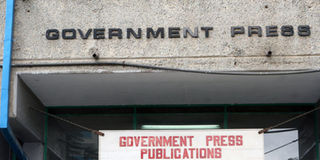No end to draft’s illegal edit puzzle

The police findings exonerated the AG’s office from blame over the changes and placed the burden entirely on the Government Press. Photo/WILLIAM OERI
An employee of the Government Printer inserted the controversial words “National Security” in the proposed constitution, according to a police report.
Investigations into the changes have revealed that the employee was in charge of filming the final copy of the proposed constitution submitted by the Attorney General’s office.
But from the evidence, it has not been possible to expose the people who might have influenced the employee, the report said. Neither is the motive of the illegal explained.
On Wednesday, the AG’s office said they had received the report which recommends that the said employee, whose name was not given, be disciplined for tampering with the proposed set of laws.
Said a statement signed by Director of Public Prosecutions Keriako Tobiko: “The illegal insertion in Article 24 (1)(d) of the words ‘National Security’ was done at the Government Press by the officer in charge of its Studio subsection.”
The insertion in the chapter on the bill of rights had the effect of limiting the rights to be enjoyed by Kenyans if the new law is passed. The report was handed over to the AG’s office last Friday by acting CID boss Peter Eregae.
“From the evidence so far collected, it has not been possible to establish the people who may have influenced the said officer to make the illegal insertion,” said Mr Tobiko.
In an attempt to uncover the plot behind the illegal edit, the DPP said the real faces behind the plot that would have plunged the proposed constitution in a legal limbo would be known after forensic investigations on computers taken from a senior officer at the Government Press are completed.
That explains why police recommend that the officer responsible for the illegal edit only receive administrative punishment. Mr Tobiko said Attorney general Amos Wako will turn over the report and the evidence it contains to an independent review and evaluation team before making public the entire truth behind the illegal edit.
The police findings also exonerated the AG’s office from blame over the changes and placed the burden entirely on the Government Press. The revelations come against a backdrop of public demands for the government to come out clearly on the criminal act committed in May just before Mr Wako published the proposed constitution.
Mr Wako learnt of the insertion of the two words “National Security” four days after he published the proposed constitution. The AG quickly called a press conference in his office and said the Committee of Experts (CoE) had drawn his attention to the fact that there were two versions of the document in circulation.
He exonerated his office from any wrong doing and ordered the Police Commissioner to appoint a team to investigate the matter within 30 days. However, the 30 days lapsed in June and Mr Wako was forced to remind the police of the due date of handing over the file three weeks ago.
The Nation was the first to raise a red flag over the possibility of illegal insertion in the proposed constitution after we received reports that the document may have been tampered with.
The newspaper was told that at least 100,000 copies of the proposed constitution were to be shredded on the orders of Mr Wako. At the time, the newspaper understood, the printing was stopped due to disagreements on the size of printing paper.
But printing experts dismissed the reason, noting all bills are printed to specific dimensions.


